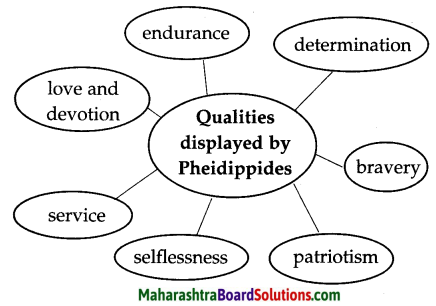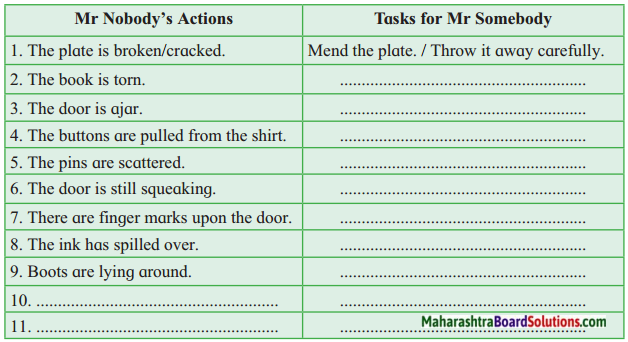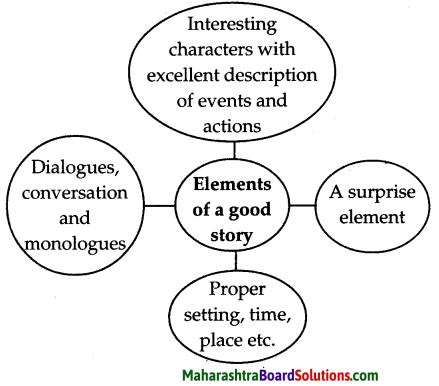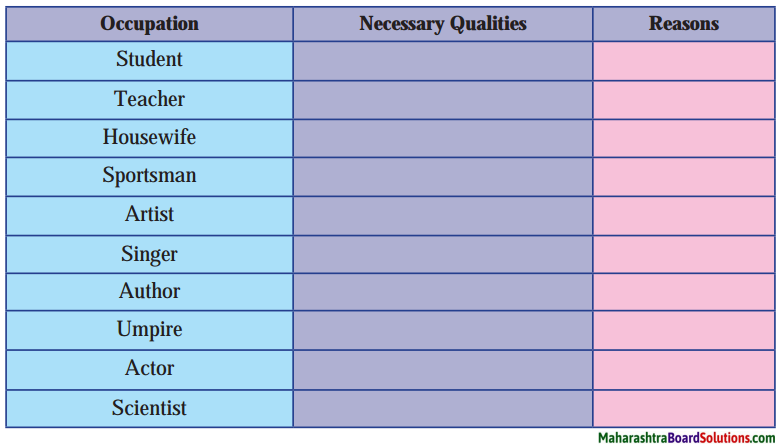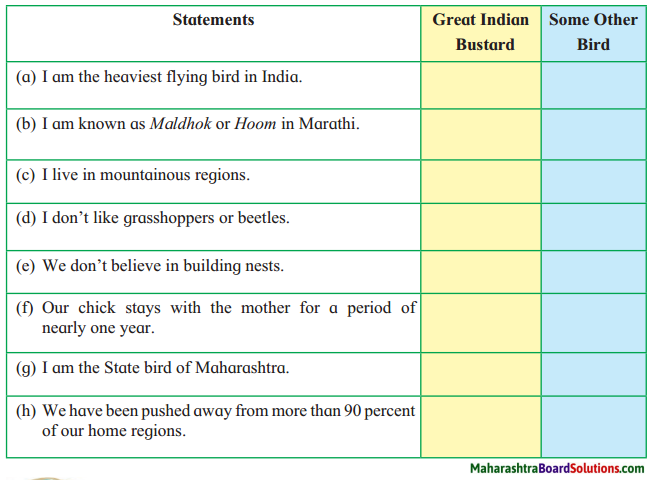Std 5 English Lesson No 1 What A Bird Thought Question Answer Maharashtra Board
Balbharti Maharashtra State Board Class 5 English Solutions Chapter 1 What a Bird Thought Notes, Textbook Exercise Important Questions and Answers.
5th Std English Poem What A Bird Thought Question Answer
English Balbharati Std 5 Digest Chapter 1 What a Bird Thought Textbook Questions and Answers
1. Find and list the rhyming words from the poem.
Question 1.
Find and list the rhyming words from the poem.
Answer:
well-shell, other-mother, find-blind, blue – you
![]()
2. Learn and recite the poem.
Question 1.
Learn and recite the poem.
Answer:
I am a parrot. I am green in colour and have a bright red beak. I was enjoying my life in the forest with my relatives. One day, a hunter came to the forest, caught me and some of my relatives. We were sold in the city market. I was taken home by my master and locked up in a beautiful cage. The cage was hung near a window.
Through the cage, I could see the vast sky and the trees, and the birds flying freely. Though my master treated me well, I was unhappy. I wanted to be with my relatives in the forest which was my home. One day, my master forgot to lock the cage.
I flew out of the cage and was back into the forest. Alas! My freedom was short-lived. I was caught again and sold. This time to someone else. Here too, I am looked after well, but once again I am in a cage, looking out at the trees and the sky and longing to get my freedom soon.
3. Describe the following in one or two lines.
Question 1.
The first little house of the bird.
Answer:
The first little house of the bird was small and round. It was made of a pale-blue shell.
![]()
Question 2.
The nest.
Answer:
The nest was a little one made up of straw. The bird thought that the nest was covered by its mother.
Question 3.
The world around the bird’s nest.
Answer:
The world around the bird’s nest were the trees filled with leaves and the vast blue sky.
4. Imagine the following and write about each in your own words:
Question 1.
What the world looks like to a baby.
Answer:
Everything in the world is new and strange for a new born baby. They have a puzzled look at anything and everything. They are curious about everything they see and hear around them. The world of the baby revolves around its mother.
Question 2.
What the world looks like to a fish.
Answer:
For a fish, its world is the blue water around it. Its world also revolves around the aquatic flora and fauna.
![]()
English Balbharati Std 5 Answers Chapter 1 What a Bird Thought Additional Important Questions and Answers
Answer the following:
Question 1.
What was the bird’s first house?
Answer:
The bird’s first house was a small, round, pale-blue shell.
Question 2.
What according to the bird was its nest made up of?
Answer:
According to the bird, its nest was made up of straw, and covered by its mother.
![]()
Question 3.
When did the bird feel that the world was made of leaves?
Answer:
The bird felt that the world was made of leaves when it fluttered out of its nest.
Question 4.
What did the bird see when it flew beyond the tree?
Answer:
The bird saw the vast blue sky when it flew beyond the tree.
Activities
Complete the web diagram with nature related nouns from the poem.
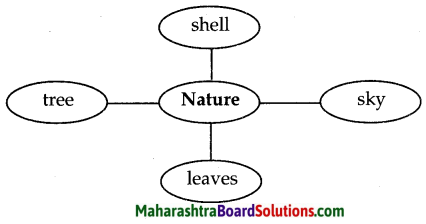
Language Study
Question 1.
Add three rhyming words to the ones given below:
(a) nest
(b) sky
(c) pale
Answer:
(a) best, rest, crest
(b) buy, high, fly
(c) hail, sail, tail
![]()
Reading Skills, Vocabulary and Grammar
Read the following extract and answer the questions given below.
Question 1.
Fill in the words that describe nature
Answer:
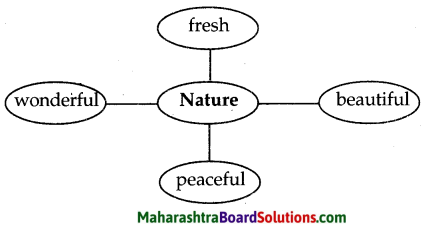
Question 2.
Name the bird’s second house.
Answer:
The bird’s second house is a little nest.
Question 3.
At first, where did the bird find itself in?
Answer:
At first the bird found itself in a small, round, pale-blue shell.
![]()
Question 4.
Pick out a pair of rhyming words from the last four lines.
Answer:
blue-you
Question 5.
Pick the odd man out:
small, round, straw, pale – blue
Answer:
straw
Question 6.
Write whether true or false:
(a) I lived in a little nest made of pale – blue shell.
(b) I lived in a little house which was small and round.
Answer:
(a) False
(b) True
![]()
Question 7.
Which is your favourite bird? Why?
Answer:
My favourite bird is peacock. It is a very beautiful bird and has multi-coloured feathers. It dances gracefully and spreads its attractive feathers when it feels it is going to rain. It is the pride of our country. It is also our national bird.
Writing Skills
Imagine and write about each in your own words:
Question 1.
What the world looks like to a fly.
Answer:
The fly being very small, everything it sees around is giant size. Even the smallest things look like monsters to the fly.
![]()
Question 2.
What the world looks like to a deer.
Answer:
For a deer, it’s world is the forest. The trees, plants, flora and fauna in the forest are its world.
What a Bird Thought Summary in English
Summary :
The poem ‘What A Bird Thought’ tells us how a bird perceives its world. When it is in its shell, it perceives (understands, becomes aware) the world to be small and round, and made of a pale-blue shell. When it comes out of its shell into its nest, it perceives the world to be made up of straw. When it grows a little and learns to fly, it perceives the world to be made up of leaves. Now that it has grown up and can fly extremely well, it has left its little home, the nest and the tree and flies wherever it wants to. And when it sees the vast blue sky, the bird is unsure what the world is really made up of. Hence, the bird wants to find out from us what the world is really like.
![]()
Meanings :
- flutter (0) – to fly unsteadily
- straw (n) – dried, thin stalks of threshed grain
- beyond (adv) – far from
Balbharti English Textbook Std 5 Unit 1
- What a Bird Thought Class 5 English Solutions
- Daydreams Class 5 English Solutions
- Be a Good Listener Class 5 English Solutions
- Strawberries Class 5 English Solutions
- The Twelve Months Class 5 English Solutions
- Announcements Class 5 English Solutions
- Major Dhyan Chand Class 5 English Solutions
- Peer Profile Class 5 English Solutions
